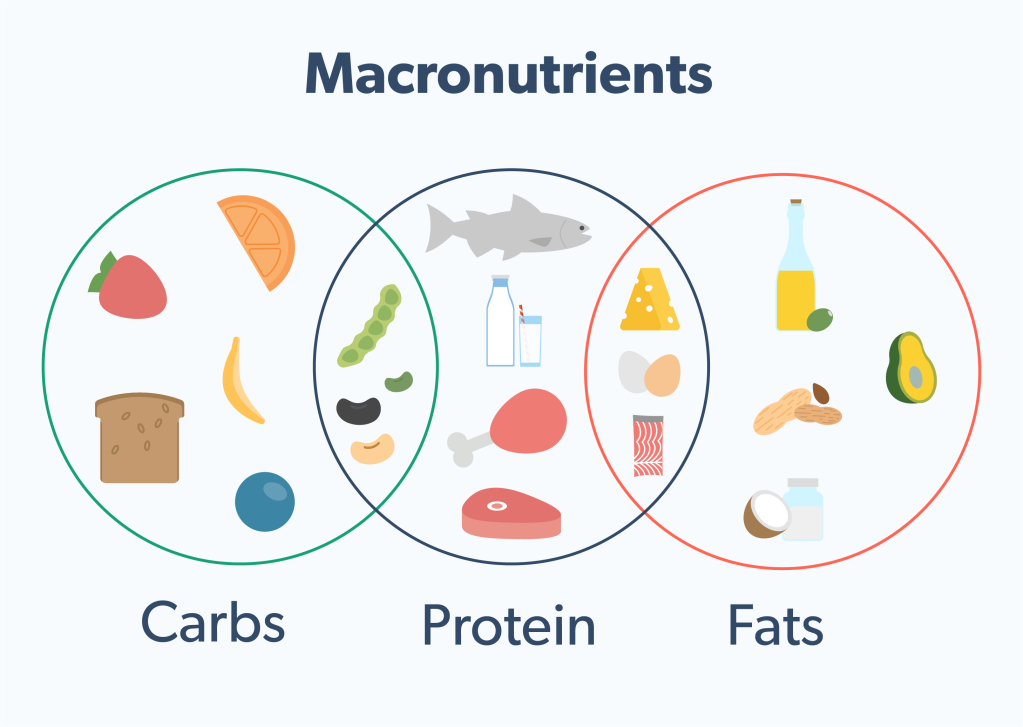Introduction
Understanding macronutrients is essential for achieving optimal health and wellness. These nutrients are the building blocks of your diet and provide your body with energy, support growth, and maintain overall function. In this article, we’ll explore the three main macronutrients: carbohydrates, proteins, and fats. We’ll discuss their roles, sources, and how to balance them in your diet.
What Are Macronutrients?
Macronutrients are nutrients that provide the energy necessary for bodily functions. They consist of:
- Carbohydrates
- Proteins
- Fats
Each macronutrient plays a unique role in supporting health. By understanding macronutrients, you can make informed choices to create a balanced diet that meets your nutritional needs.
1. Carbohydrates: Your Body’s Primary Energy Source
Carbohydrates are the body’s main source of energy. When consumed, your body breaks them down into glucose, which fuels your brain, muscles, and organs.
Types of Carbohydrates
- Simple Carbohydrates: Found in fruits, honey, and refined sugars. They provide quick energy but can lead to blood sugar spikes.
- Complex Carbohydrates: Found in whole grains, legumes, and vegetables. They offer sustained energy due to their fiber content.
How Much Do You Need?
Aim for 45-65% of your total daily calories from carbohydrates. Choose whole, unprocessed sources to maximize health benefits.
2. Proteins: Essential for Growth and Repair
Proteins are crucial for building and repairing tissues. They play a key role in muscle development, immune function, and hormone production.
Sources of Protein
- Animal Sources: Meat, poultry, fish, eggs, and dairy products are complete proteins, containing all essential amino acids.
- Plant Sources: Beans, lentils, nuts, and seeds provide protein, but may lack one or more essential amino acids. Combining them can create a complete protein profile.
Recommended Intake
Adults should aim for 10-35% of their daily calories from protein. This translates to about 46 grams per day for women and 56 grams for men.
3. Fats: Vital for Hormone Production and Nutrient Absorption
Fats are essential for overall health, providing energy, supporting cell growth, and aiding in nutrient absorption. They also help produce hormones and protect organs.
Types of Fats
- Unsaturated Fats: Found in olive oil, avocados, nuts, and fatty fish. These are heart-healthy and can help lower bad cholesterol levels.
- Saturated Fats: Found in red meat, butter, and full-fat dairy. Limit these to reduce the risk of heart disease.
- Trans Fats: Often found in processed foods. Avoid these entirely, as they can increase bad cholesterol and lower good cholesterol.
How Much Fat Do You Need?
Aim for 20-35% of your total daily calories from fats. Focus on unsaturated fats while limiting saturated and trans fats.
Balancing Macronutrients for Optimal Health
To achieve a balanced diet, it’s essential to incorporate all three macronutrients. Here are some tips for balancing them:
- Assess Your Activity Level: More active individuals may need a higher carbohydrate intake for energy.
- Incorporate Variety: Include a range of foods from each macronutrient category to ensure you receive all essential nutrients.
- Plan Your Meals: Use a balanced plate model, filling half with fruits and vegetables, one quarter with protein, and one quarter with whole grains.
Track Your Macronutrient Intake
Understanding macronutrients helps you make informed dietary choices. Consider using apps or tools to track your intake. This can help you ensure you’re meeting your nutritional goals.
Boost Your Nutrition with AI-Powered Wellness Mobile Software

Mastering understanding macronutrients is a significant step toward better health. However, tracking your overall nutritional intake is equally important. Our AI-powered wellness mobile software helps analyze your daily nutrition consumption and offers personalized suggestions for improvement. Whether you’re focused on weight management, muscle building, or overall wellness, the software uses AI to provide tailored feedback based on your unique dietary needs.
Additionally, the app connects you with professional registered dietitians (RDs) for one-on-one consultations. For US-based users, insurance can cover free consultations with an RD. As we continue to develop the app, it will also support features for managing eating disorders and mental health, helping you achieve comprehensive wellness.

